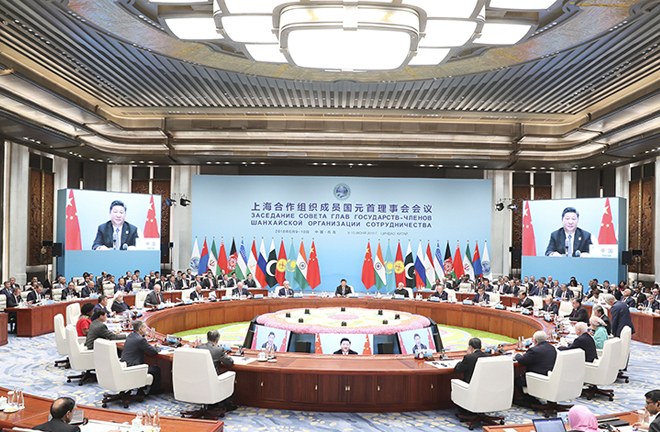SCO summit delivers message of harmony and cooperation

Chinese President Xi Jinping delivers a speech at the 18th Shanghai Cooperation Organization (SCO) summit in Qingdao, the coastal city in east China’s Shandong Province on June 10.(XINHUA)
“We should, guided by the Shanghai Spirit, work closely to build an SCO community with a shared future, move toward a new type of international relations and build an open, inclusive, clean and beautiful world that enjoys lasting peace, universal security, and common prosperity,” said Chinese President Xi Jinping at the 18th Shanghai Cooperation Organization (SCO) Summit in Qingdao, a coastal city in east China’s Shandong Province on June 10.
In the 17 years that have passed since it was established in Shanghai, the SCO has been bolstered by the “Shanghai Spirit” of mutual trust, mutual respect, equality, respect for diverse civilizations and pursuit of shared development.
With the 2017 addition of India and Pakistan as full members at the Astana summit, the SCO has developed into a comprehensive regional organization with the largest population, the most extensive geographical area and huge potential.
SCO Secretary-General Rashid Alimov said SCO members are equals regardless of population size, economic scale or military strength. Within the framework of the SCO, there is no distinction of big or small, strong or weak, but only future-oriented partners that seek world peace, stability and prosperity as a common purpose.
According to a public opinion survey in Kazakhstan on the most influential international organization in the region, the SCO ranks first among the United Nations, the European Union and many other international organizations, said Yao Peisheng, former Chinese ambassador to Kazakhstan.
Sun Zhuangzhi, secretary-general of the SCO Research Center at the Chinese Academy of Social Sciences (CASS), said that the SCO itself and its international environment have undergone tremendous changes since it was founded. The Shanghai Spirit must keep pace with the times and reflect the features of the new era.
China has proposed the concept of a community of shared future for mankind together with the concept of a new type of international relations featuring mutual respect, fairness, justice and win-win cooperation, conforming to the trend of peace, development, cooperation and mutual benefit. They reflect the common aspirations of the SCO’s member states, proposing directional guidance for developing and enriching the Shanghai Spirit, Sun concluded.
Maintaining regional security and stability is the SCO’s priority. Zeng Xianghong, a professor at the Institute for Central Asian Studies at Lanzhou University, said that the SCO has established a relatively complete legal system of security cooperation through such documents as the Shanghai Convention on Combating Terrorism, Separatism and Extremism and the SCO Convention on Countering Extremism.
By establishing regional counter-terrorism agencies, the SCO has facilitated cooperation and coordination among security entities in its member states. Through joint anti-terrorism military exercises, member states have enhanced their collective capacity to jointly fight terrorism, Zeng said.
One of the priorities of the Qingdao summit is to combat terrorism, separatism and extremism—dubbed as the “three evil forces”—as well as other transnational threats like drug trafficking and cybercrime. Shi Ze, executive director of the China Center for SCO Studies, said that the Qingdao summit promoted the SCO to form greater synergy in the fight against the three evil forces and strive to become the guiding force for counter-terrorism in the international arena.
For example, the SCO will play a more important role in hot regional issues in Afghanistan and other places. “The Qingdao summit has provided a clearer guide for the SCO members to strengthen security cooperation,” Shi said.
Realizing common development is an important goal set by the SCO since its establishment. The Qingdao summit emphasizes development and a drive for common prosperity. In particular, it promotes the construction of the “Belt and Road” (“B&R”) initiative and enhances the overall level of regional economic cooperation.
Through infrastructure construction, “B&R” will help facilitate transport and energy cooperation between the SCO member states, said Liu Ying, a research fellow at the Chongyang Institute for Financial Studies at Renmin University of China. By facilitating the smooth flow of trade, “B&R” can promote cooperation of customs, inspection and quarantine, accelerating the construction of the SCO free trade area.
Through financial cooperation, the “B&R” will strengthen the role of the SCO Interbank Consortium and encourage cooperation with financial institutions including the Silk Road Fund and the Asian Infrastructure Investment Bank, which is conducive to stimulating SCO’s economic integration, Liu said.
MAO LI is a correspondent with Chinese Social Sciences Today.
(edited by JIANG HONG)
